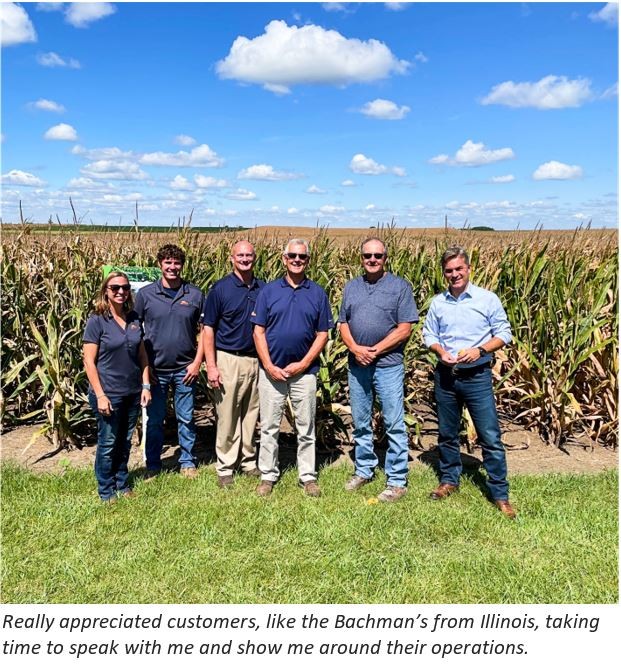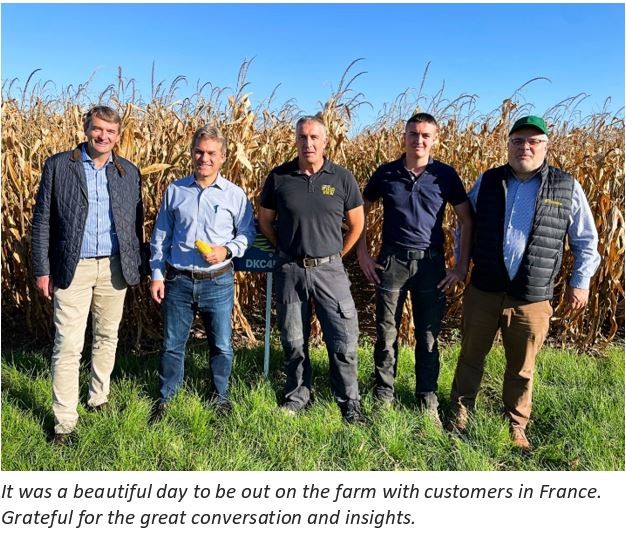Listening to the Land
by Rodrigo Santos, Chief Operating Officer at Bayer Crop Science
Published 12-28-21
Submitted by Bayer

Growing up in a small town in Brazil, one of my fondest memories was visiting my grandfather’s citrus farm. I spent many weekends there, sometimes helping to plant trees, but mostly wallowing in the mud along the lake and building boats that invariably failed to float. My grandfather loved to teach the basics of farming to me – and one of his lessons that I distinctly remember was to “listen to the soil.” Little did I know at the time how much wisdom was packed into those few simple words.
Listening has been a top priority for me right now as I settle into my new role. I’ve been traveling throughout the United States and Europe these past few months, visiting with customers and hearing their thoughts and concerns about the agriculture industry. These visits have reinforced my belief that farmers are not only faithful stewards of the land, but they’re also leading the way to a more sustainable future. Like my grandfather, they love the land that sustains them and know that it must be responsibly managed for their livelihood and for that of the next generation. But unlike my grandfather, today’s famers have access to some innovative new technologies that can help turn that hope into a reality.

A consistent concern I’ve heard from many farmers over the world is that the general public doesn’t fully understand the business of agriculture, or the steps being taken to protect the environment. Our industry has done a great job at explaining how we’ve increased crop productivity – with higher yields year after year – but we haven’t been as clear in highlighting our environmental efforts. That’s why Bayer is working with farmers and partners as part of our commitment to sustainable agriculture. And that’s where the intersection of science and innovation is truly making a difference!
Healthy soils are key to a more sustainable future. Agricultural and forestry uses contribute nearly a quarter of human greenhouse gas emissions, but they also absorb about one-third of all carbon dioxide emissions coming from fossil fuels and industrial activities. When soils are protected, they provide a haven for microbial species to do their thing – which includes consuming carbon that might otherwise be lost to the atmosphere and contribute to climate change. Rich soils conserve water, are far less prone to erosion, provide habitats for wildlife, and help farmers keep fuel and fertilizer uses to a minimum. Healthy soils are not just more sustainable, they also make good business sense.
Last year Bayer launched our Carbon Initiative in the United States and Brazil (and we recently launched the program in Europe), which provides incentives to famers for keeping their soils healthy and productive. For example, participating U.S. growers are paid a per-acre fee when they use climate-smart agricultural practices, such as low tillage and cover crops, to help keep carbon in the soil, instead of releasing it to the atmosphere. While farmers have used these common practices for years, the development of data science and digital tools have made carbon capture quantifiable, creating a virtual new crop opportunity for growers to increase the profitability of their farm.
The response to our carbon program by Brazilian and U.S. farmers has been overwhelmingly positive. As the program continues to expand in other regions, it speaks to the commitment of our industry and farmers to make agricultural sustainability a priority, not an afterthought. That’s important because there are only nine harvests between now and the year 2030, when Bayer and many other organizations and industries are working to deliver on their aggressive sustainability targets.
I learned some of my greatest life lessons from my grandfather on his farm. He intuitively understood how the soil can speak to us if we take the time to listen. Through modern agricultural tools and practices, we have both the obligation and the means to reply and help farmers protect their land now and generations to come.

Bayer
Bayer
Bayer: Science For A Better Life
Bayer is a global enterprise with core competencies in the Life Science fields of health care and agriculture. Its products and services are designed to benefit people and improve their quality of life. At the same time, the Group aims to create value through innovation, growth and high earning power. Bayer is committed to the principles of sustainable development and to its social and ethical responsibilities as a corporate citizen. In fiscal 2015, the Group employed around 117,000 people and had sales of EUR 46.3 billion. Capital expenditures amounted to EUR 2.6 billion, R&D expenses to EUR 4.3billion. These figures include those for the high-tech polymers business, which was floated on the stock market as an independent company named Covestro on October 6, 2015. For more information, go to www.bayer.com.
More from Bayer

